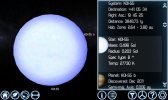Exoplanet Explorer Lite android apk free download

 Name - Exoplanet Explorer Lite
Name - Exoplanet Explorer LiteCategory - education
Resolution - multi
Type - Android 2.2 Froyo
Size - 9443 KB
Rating - 2/5 from 70 ratings
| Rate this app: | |
| 2253 downloads | |
Description:
Ver 2.1.5, for Android OS 2.2 and up
Take a journey into deep space to visit alien worlds around distant stars
Exoplanet Explorer takes you on a journey into deep space, beyond the limits of our Solar System. Based on the latest available data, you'll explore virtual models of more than 700 known planets and the star systems that they inhabit.
The data is sourced from The Exoplanet Encyclopaedia, SIMBAD, and scientific papers, and if it's not available from one of these sources, then wherever possible it will be calculated or estimated, giving you access to one of the most complete exoplanet databases.
In addition to an intuitive interface which allows touch driven navigation through our Galaxy, Exoplanet Explorer also offers a comprehensive search tool which will let you find the planets and systems that you are interested in. This includes the ability to both search and sort by planet name, the number of planets in a system or even then number of stars in a system, to name just a few.
Statistics are provided to summarise the information in the database and give you a global perspective.
Planets have been divided up into 6 classes, and further subdivides into 3 temperature classes. This information has then been used to create models which are then assembled into working solar systems to give you an idea of what they might look like if we could travel there today.
The full version of Exoplanet Explorer features automatic data updating whenever new planets are discovered, Hi-def graphics for tablets or large screen phones, advanced statistics, functions to help you compare our solar system to others, and no ads!
Planet are divided into the following mass classes:
* Mercurian - rocky worlds that have the approximate mass of Mercury
* Sub-terran - rocky planets with a mass similar to Mars
* Terran - rocky worlds with similar mass to Earth
* Super-terran - rocky worlds with a higher mass than Earth
* Neptunian - gas giants similar to Neptune
* Jovian - gas giants as massive or more massive than Jupiter
The planets are further divided into the following temperature classes:
* Hot - planets that are too hot to support liquid water
* Warm - planets in the star's habitable zone where liquid water could exist
* Cold - planets beyond the habitable zone where water would only exist as ice
Ver 2.1.5, for Android OS 2.2 and up
Take a journey into deep space to visit alien worlds around distant stars
Exoplanet Explorer takes you on a journey into deep space, beyond the limits of our Solar System. Based on the latest available data, you'll explore virtual models of more than 700 known planets and the star systems that they inhabit.
The data is sourced from The Exoplanet Encyclopaedia, SIMBAD, and scientific papers, and if it's not available from one of these sources, then wherever possible it will be calculated or estimated, giving you access to one of the most complete exoplanet databases.
In addition to an intuitive interface which allows touch driven navigation through our Galaxy, Exoplanet Explorer also offers a comprehensive search tool which will let you find the planets and systems that you are interested in. This includes the ability to both search and sort by planet name, the number of planets in a system or even then number of stars in a system, to name just a few.
Statistics are provided to summarise the information in the database and give you a global perspective.
Planets have been divided up into 6 classes, and further subdivides into 3 temperature classes. This information has then been used to create models which are then assembled into working solar systems to give you an idea of what they might look like if we could travel there today.
The full version of Exoplanet Explorer features automatic data updating whenever new planets are discovered, Hi-def graphics for tablets or large screen phones, advanced statistics, functions to help you compare our solar system to others, and no ads!
Planet are divided into the following mass classes:
* Mercurian - rocky worlds that have the approximate mass of Mercury
* Sub-terran - rocky planets with a mass similar to Mars
* Terran - rocky worlds with similar mass to Earth
* Super-terran - rocky worlds with a higher mass than Earth
* Neptunian - gas giants similar to Neptune
* Jovian - gas giants as massive or more massive than Jupiter
The planets are further divided into the following temperature classes:
* Hot - planets that are too hot to support liquid water
* Warm - planets in the star's habitable zone where liquid water could exist
* Cold - planets beyond the habitable zone where water would only exist as ice

 Choose mobile
Choose mobile Login
Login Signup
Signup







 Download directly on your phone by scanning this QR code
Download directly on your phone by scanning this QR code